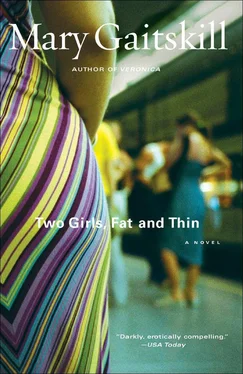Mary Gaitskill - Two Girls, Fat and Thin
Здесь есть возможность читать онлайн «Mary Gaitskill - Two Girls, Fat and Thin» весь текст электронной книги совершенно бесплатно (целиком полную версию без сокращений). В некоторых случаях можно слушать аудио, скачать через торрент в формате fb2 и присутствует краткое содержание. Год выпуска: 2012, Издательство: Simon & Schuster, Жанр: Современная проза, на английском языке. Описание произведения, (предисловие) а так же отзывы посетителей доступны на портале библиотеки ЛибКат.
- Название:Two Girls, Fat and Thin
- Автор:
- Издательство:Simon & Schuster
- Жанр:
- Год:2012
- ISBN:нет данных
- Рейтинг книги:5 / 5. Голосов: 1
-
Избранное:Добавить в избранное
- Отзывы:
-
Ваша оценка:
- 100
- 1
- 2
- 3
- 4
- 5
Two Girls, Fat and Thin: краткое содержание, описание и аннотация
Предлагаем к чтению аннотацию, описание, краткое содержание или предисловие (зависит от того, что написал сам автор книги «Two Girls, Fat and Thin»). Если вы не нашли необходимую информацию о книге — напишите в комментариях, мы постараемся отыскать её.
Review) create a haunting and unforgettable journey into the dark side of contemporary life and the deepest recesses of the soul.
Two Girls, Fat and Thin — читать онлайн бесплатно полную книгу (весь текст) целиком
Ниже представлен текст книги, разбитый по страницам. Система сохранения места последней прочитанной страницы, позволяет с удобством читать онлайн бесплатно книгу «Two Girls, Fat and Thin», без необходимости каждый раз заново искать на чём Вы остановились. Поставьте закладку, и сможете в любой момент перейти на страницу, на которой закончили чтение.
Интервал:
Закладка:
She spent much of the day behind this desk with Glenda, welcoming the patients as they teetered in on their canes, hats listing on their heads. She wrote down their names, addresses, and birth dates on large index cards and guided them down the treacherously rumple-rugged hall to the electrocardiogram room, where she got them to take off their clothes and lie on the table so she could wire them to the machine. The EKG was a uniquely intimate process. The old, often odorous and clammy body lay spread out before her, affable and trusting, willing to let her squeeze blobs of white conducting glue on its ankles and wrists. Women lay docile as she lifted their limp breasts for the little red suction cups, even if there were lumpy brown sores beneath them. She saw eczema and swollen ankles and fragile chests bearing terrible scars. A lady with one eye blinded by milky fluid showed her the dainty bag of protective talismans she kept safety-pinned to her dirty bra.
One day she asked a fat, sweating woman how she was, and the lady burst into tears. “My husband, he is beating me,” she said. “I am bruised, see?”
Justine was alarmed to see brown and purple splotches on her chest and stomach. Her alarm flustered her, and she didn’t know what to say. “Why don’t you hit him back?” she asked idiotically. “You’re pretty big.”
“Oh, he would kill me, he would crush me! He was in the army, he is strong, he knows how to kill!”
“Can’t you leave?”
“Where would I go? I have no children. I have no one. He is going to kill me!” The weeping little eyes were finely shot with yellow veins.
Justine handed her a box of Kleenex. She took the EKG printout into Dr. Winkgard’s office. “I think something terrible is happening,” she said. “Mrs. Rabinowitz says her husband is beating her.”
“Mrs. Rabinowitz is crazy,” he said. “It’s a very tragic case. She has a brain disease.”
“But I saw bruises.”
“Well, he does beat her sometimes, but she exaggerates. Sometimes she thinks the pills I give her are poison and she won’t take them. It is a tragedy.”
He went into the cardiogram room, and Justine heard him ask in his vibrant red ball of a voice, “How are we today, Mrs. Rabinowitz?” She took the manila folders of patients already seen and went back to the reception area. Mrs. Winkgard was picking the wilting blossoms from orchids in a vase, her head tilted slightly in appraisal.
“Glenda, Mrs. Rabinowitz just told me something terrible. She says her husband beats her. I told the doctor and he—”
“Yes, yes,” said Glenda. “I know the situation. It is very sad. Both Jonathan and I have spoken to Mr. Rabinowitz. It seems to help for a while, but then he reverts. We’ve spoken to her as well. The problem is, she is as disturbed as he is.”
“But it seems that something—”
The buzzer rang, and Glenda put a finger to her lips. It was Mrs. Wolfen, Mrs. Rabinowitz’s sister. Her entrance, a dour presentation of ragged gray overcoat, folded hands, and disapproving jowls, effectively ended the conversation.
Sometimes a young person with a delicate heart would come to the office. If that person was a young woman, Dr. Winkgard would poke his smiling head out of his office to watch her advance towards him, his grin-wrinkled face set in the gloating, indulgent expression of a client just introduced to a teenaged prostitute. If it was a young man, the doctor would grin a more robust, less liquid grin and swing his hand through the air until it violently connected with the patient in a handshake of health and camaraderie that would have floored an oldster.
“It is good for him to look at a young body for a change,” said Glenda.
It was from one of these diversionary young bodies that Justine got her idea.
He was a small nervous boy with a large round forehead, a saucy jawline, palpitations, and shortness of breath. Justine took him into the EKG room and closed the door. He took off his shirt and lay down; the little room became their private planet, with Dr. and Mrs. Winkgard hovering in the distance like friendly stars.
“What do you do?” asked Justine.
“I’m a writer,” he said, “although I’ve never been published.” He lifted his pretty head and looked at the painless clamps on his wrists and ankles.
“It’ll only take a minute,” she said.
He dropped his head back on the institutional pillow. “The thing is, I find it so hard to concentrate. I haven’t written anything for a while.”
“I write too,” she said.
“Oh, then you understand.”
The machine began to whirr; the thin needles jerkily sketched their abstract of the boy’s heart.
“What do you think of Anna Granite?” he asked.
“I’ve never read her.”
“Really? Oh, you’ve got to read her. She’s the most unique writer. Of course, I don’t believe in what she says politically, but still she’s so powerful. Especially now, when people are so into whining and abdicating responsibility, it’s good to read somebody advocating strength and power, and doing things. She had a lot of influence on me. I even thought of joining a Definitist organization.”
“A what?”
“You know, the groups they used to have in the sixties where they got together and studied Granite’s work. They’re still around.”
“You’re kidding.” She cut the printout on the tiny teeth of the machine and stuck it on the mounting paper. “I mean I knew she was popular, but—”
Dr. Winkgard entered with a broad flap of the door, shoulders squared in his white coat. “Come, Justine, what is taking so long?”
She returned to the stack of papers at her desk and brooded excitedly. It is hard to say why the Anna Granite story had impressed her, but almost immediately on hearing it she formed the tiny damp mushroom of an idea. Justine was morbidly attracted to obsessions, particularly the useless, embarrassing obsessions of the thwarted. She could not help but be drawn to the spectacle of flesh-and-blood humans forming their lives in conjunction with the shadows invented by a mediocre novelist.
“Glenda, have you ever read anything by Anna Granite?”
“Ah yes.” Mrs. Winkgard nodded, her stubborn mouth set in admiration. “Very good writing, very dramatic. The clarity, the way she states her case. I read The Bulwark at a time when I was undergoing a crisis, and it gave me such moral support to read about those strong characters doing great things.”
When Justine left work she bought a bag of cookies and rode home on the subway eating them with queenly elation, impervious to the crumpled bags and bad smells, the empty soda cans rattling about her feet. When she entered her apartment, she stripped off her pantyhose and called an editor she knew at Urban Vision.
The next day, she placed brief ads in Manhattan Thing, a monthly, and the weekly Urban Vision. To be sure she reached the serious nut population, she made up several index cards bearing a neutral statement which she placed on bulletin boards in right-wing bookstores, cafés, and an NYU building. She serendipitously stuck one on the wall of a laundromat in Queens where she had gone to argue with an ex-boyfriend before loaning him some money. Then she bought all of Granite’s books, and started reading The Last Woman Alive, the story of a young woman caught in the grip of a socialist revolution in an imaginary society.
On Thursdays she went to the library with her notebook under her arm and did research. Granite had cut a colorful path through the media, starting with a few mild reviews of her early short-story collection, building in the seventies into lengthy, incredulous, outraged reviews as well as full-blown features about the “Stern Young Cult of Anna Granite,” eventually culminating in sarcastic editorial denunciations by Austin Heller, Shepard Shale, and Michael Brindle, the foremost magazine intellectuals of the left and right wings. The last little noise was a long obituary in Opinion by Heller, in which he told the story of their tentative friendship and eventual violent feud, after which Granite refused to be in the same room with him. He gloatingly referred to a time Granite “bawled” at a party after being insulted by a professor.
Читать дальшеИнтервал:
Закладка:
Похожие книги на «Two Girls, Fat and Thin»
Представляем Вашему вниманию похожие книги на «Two Girls, Fat and Thin» списком для выбора. Мы отобрали схожую по названию и смыслу литературу в надежде предоставить читателям больше вариантов отыскать новые, интересные, ещё непрочитанные произведения.
Обсуждение, отзывы о книге «Two Girls, Fat and Thin» и просто собственные мнения читателей. Оставьте ваши комментарии, напишите, что Вы думаете о произведении, его смысле или главных героях. Укажите что конкретно понравилось, а что нет, и почему Вы так считаете.












